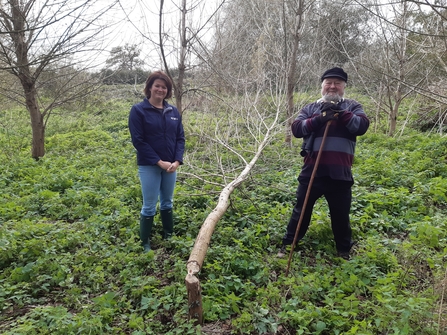One discovery by a member of the public came from the banks of the River Stour near Gillingham. The interesting find was on a section of riverbank where Gillingham Action for Nature Group (GANG) had previously participated in some tree planting. One of the trees, planted around 13 years ago, was discovered felled and Dorset Wildlife Trust were called to verify the field sign and confirmed it was the work of a beaver.
Eurasian beavers (Castor fiber) are making a comeback in the UK. In October 2022 they were officially recognised as a resident native species in England once again and afforded European protective status having previously been hunted to extinction over 400 years ago. The origin of the beavers in the Dorset Stour is unknown, although there are beavers living in neighbouring river catchments to the north in Somerset and animals could have made their way through the landscape.

